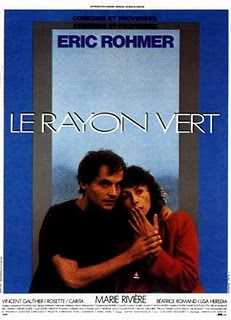The spirit of the White Elephant Blogathon follows the spirit of the Christmas gift-exchange tradition of the same name: choose a gag gift (or an awful movie in this case) that some other dope will be forced to watch and write about. Now, you don't want to choose a movie that's "so bad it's good" - you want to choose a movie that's so bad it will inflict pain on the viewer.
When the verdict came in for the movie to which I was assigned, I have to admit I was both puzzled and relieved. The film was Summer (but let's call it by its original name, Le Rayon Vert), a mid-late career entry by the French New Wave filmmaker Eric Rohmer. Clueless as I am about film history, I'd never seen a Rohmer film before and I was only vaguely familiar with his name when I heard that he died last January.
Anyway, those who are familiar with Rohmer's work may have understood why Le Rayon Vert was an intriguing submission by one of the blogathon's participants. From what I gather the film demonstrates much of what made Rohmer's work loved by some and reviled by others (a character in the 1975 film Night Moves describes watching his films as "kind of like watching paint dry").
 I wouldn't say it was that bad, but I can't say I find much to love about this highly acclaimed film, either. Maybe Roger Ebert said it best (doesn't he always?) in his three-star review of Le Rayon Vert: "If Eric Rohmer were basing a film on your diary, he would only use the entries where you observe that nothing much happened."
I wouldn't say it was that bad, but I can't say I find much to love about this highly acclaimed film, either. Maybe Roger Ebert said it best (doesn't he always?) in his three-star review of Le Rayon Vert: "If Eric Rohmer were basing a film on your diary, he would only use the entries where you observe that nothing much happened."It's true. Le Rayon Vert is about nothing, much in the same way "Seinfeld" was about nothing. The completely self-absorbed (and conspiciously beautiful) characters sit around and talk...er, rather, complain about their unrealized lives. Nevermind that they are attractive, well-educated, and relatively wealthy - their lives constitute an eternal exercise in romantic suffering.
Our protagonist in Le Rayon Vert is Delphine (Marie Rivière), a twenty-something Parisian who eschews conformity in many aspects of her life, most notably in her refusal to enter into meaningless relationships with men. Her summer vacation plans fall apart when she is ditched by her friend at the last minute, forcing her to bounce around beautiful French settings, alone and suddenly in search of herself and, if it's around, true love. After hearing an older man describe the physics and romantic symbolism of the green ray (le rayon vert) left by a setting sun, her lonely desperation worsens. At the eleventh hour she acts completely out of character in pursuit of a young man, and as you can see in the clip below, the film ends with a predictable setting sun scene.
Is Le Rayon Vert boring? Mostly, at least in the same way that people think Gus Van Sant movies are boring. But Gerry this is not; there are a handful of interesting discussions if you can stay awake in between them, and while it's never as charming as something like Before Sunrise, I think Le Rayon Vert still has the potential to connect with particular individuals at particular periods in their lives (i.e., twenty-somethings facing a "quarter-life crisis"). That doesn't explain why it was so well received by critics, but perhaps we can assume that they were respecting the filmmaker more than the film.
At its worst, Le Rayon Vert is a tedious example of French intellectual blather. At its best, it's a tedious example of French intellectual blather that can be mostly tolerated because it's being said by beautiful people in beautiful settings. Take that for what you will, but I'll take some solace that I mostly dodged a bullet with the white elephant this year...

